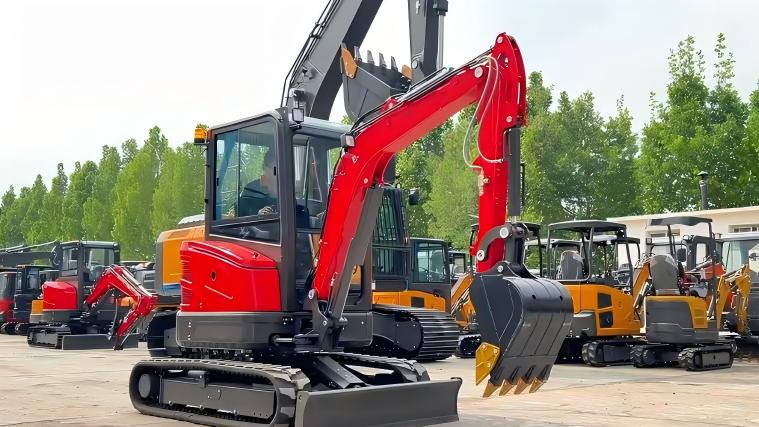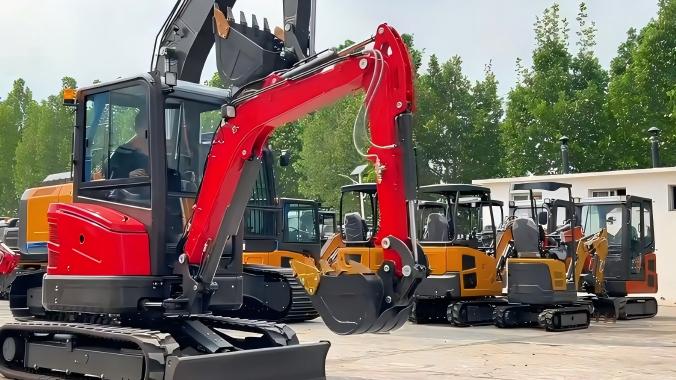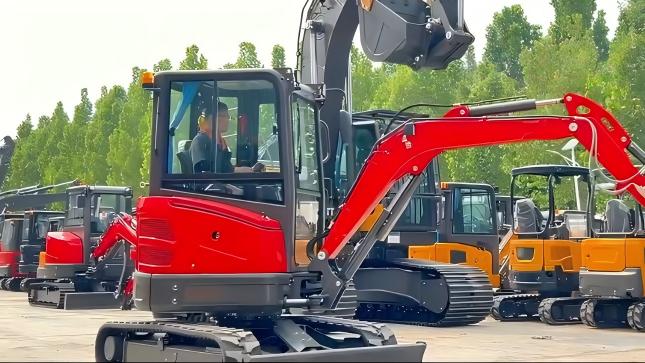The Broad Spectrum of Excavator Costs
A brand-new excavator can range anywhere from $30,000 for a small mini-excavator to over $2,000,000 for a massive, specialized mining machine. This wide range underscores the importance of understanding the specific needs of your project or business before making a purchase.
Pricing by Size Category
Excavators are typically categorized by their operating weight, which directly correlates with their digging capacity and overall power.
Mini Excavators (1-6 metric tons): $30,000 - $110,000
1-2 tons: Typically range from $30,000 to $60,000. These are the smallest and most maneuverable, ideal for tight spaces, residential landscaping, plumbing, and small demolition projects.
3-4 tons: Price points generally fall between $60,000 and $85,000. Offering more power and digging depth, they are suitable for slightly larger residential work and light commercial tasks.
5-6 tons: Can cost from $85,000 to $110,000. These mini excavators bridge the gap between small and compact, providing increased versatility for a broader range of jobs.
Compact Excavators (7-10 metric tons): $120,000 - $180,000
These machines offer a significant jump in power and capacity compared to mini excavators. They are well-suited for medium-sized construction projects, utility work, and more demanding landscaping tasks. Prices typically start around $120,000 for 6-7 ton models and can go up to $180,000 for 8-10 ton machines.
Medium Excavators (11-25 metric tons): $190,000 - $300,000
This is the most common size class for general construction, road building, and commercial site preparation. The price range is broad due to the varying sizes and capabilities within this category. You can expect to pay from $190,000 up to $300,000 or more, depending on the specific model and features.
Large Excavators (26-45+ metric tons): $300,000 - $600,000+
Designed for heavy-duty applications like large-scale construction, quarrying, and significant demolition, these machines command premium prices.
25-30 tons: $300,000 - $400,000
31-40 tons: $400,000 - $500,000
41-45 tons: $500,000 - $600,000+
Specialized models used in large-scale mining operations can easily exceed $1,500,000 to $2,000,000.
Key Factors Influencing Excavator Price
Beyond size, several other critical factors contribute to the final price of a new excavator:
Brand:
Premium Brands: Manufacturers like Caterpillar (CAT), Komatsu, John Deere, Hitachi, and Volvo are renowned for their quality, reliability, advanced technology, and extensive dealer networks. Their new excavators typically fall on the higher end of the price spectrum.
Mid-Range Brands: Brands such as Kubota, Bobcat, Takeuchi, Yanmar, Doosan, and Hyundai offer competitive pricing with a strong focus on specific market segments (e.g., mini and compact excavators for Kubota and Bobcat).
Value-Oriented Brands: Some manufacturers, particularly those from China like Sany, often provide more budget-friendly options, appealing to cost-conscious buyers.
Features and Technology:
Engine and Hydraulics: More powerful engines, advanced hydraulic systems (e.g., load-sensing hydraulics), and fuel-efficient technologies (e.g., idle shutdown, eco modes) can increase the base price.
Operator Comfort and Ergonomics: Features like heated/cooled seats, advanced climate control, intuitive joystick controls, larger displays, and improved sound insulation in the cab contribute to a higher price.
Safety Features: Advanced safety systems such as rearview cameras, 360-degree cameras, object detection, proximity sensors, and tilt alarms can add to the cost.
Telematics and GPS/Grading Systems: Integrated telematics systems (for tracking machine performance, location, and maintenance needs) and advanced GPS-guided grading systems can add significant value and cost, often ranging from $15,000 to $30,000.
Attachments and Accessories
The basic price of an excavator typically includes a standard bucket. However, most jobs require a variety of specialized attachments, which can add substantially to the overall investment.
Common Attachment Costs:
Compactors: $5,000 - $10,000
Grapples: $4,000 - $12,000
Augers: $3,000 - $7,000
Hydraulic Breakers/Hammers: $10,000 - $25,000
Multiple Buckets (different sizes/types): $1,000 - $5,000+ per bucket
Quick Couplers: For easily swapping attachments, these can range from a few thousand to over $10,000.
Thumbs (Hydraulic/Mechanical): Essential for handling irregular objects, typically $2,000 - $8,000.
The more specialized or high-tech the attachment, the higher its cost.
Dealer and Location:
Prices can vary slightly between dealerships and geographical regions due to shipping costs, local market demand, and competitive pricing strategies.
The level of after-sales support, warranty, and service packages offered by the dealer can also influence the price.
Market Conditions:
Supply and demand, economic conditions, and material costs can all impact excavator prices. For example, during periods of high demand or supply chain disruptions, prices may increase.
Beyond the Purchase Price: Total Cost of Ownership
It's crucial to remember that the purchase price is only one component of the total cost of ownership (TCO). Other significant ongoing costs include:
Fuel Consumption: Excavators are heavy fuel consumers, especially larger models.
Mini excavators: 0.5 to 1.5 gallons per hour
Standard excavators: 2 to 5 gallons per hour
Large excavators: 5 to 15+ gallons per hour
Maintenance and Repairs: Regular maintenance (oil changes, filter replacements, greasing) is essential. Major repairs (undercarriage, engine, hydraulics) can be very expensive.
Routine maintenance: $150 - $400 per service, or $3,000 - $5,000 annually.
Undercarriage maintenance (tracks, rollers, sprockets): $2,000 - $10,000+ per component replacement.
Operator Wages: Skilled excavator operators command competitive wages, typically $15 to $40+ per hour depending on experience and location.
Transportation: Moving larger excavators between job sites requires specialized transport, incurring costs from $150 for mini excavators to over $1,200 for large machines per move.
Insurance: Protecting your investment against damage, theft, or liability.
Storage: If the excavator is not in constant use, secure storage may be required.
Financing Options
For many businesses, outright purchase of a new excavator is not feasible. Various financing options are available:
Equipment Loans: Traditional loans from banks or financial institutions.
Leasing: Offers lower monthly payments and flexibility, with options to purchase the equipment at the end of the lease or upgrade to a newer model. Many manufacturers, like Kobelco with their KOBELCO Financial Services, offer special low-rate financing and lease promotions.
Dealer Financing: Many dealers offer in-house financing programs, often with competitive rates and terms, sometimes tied to specific promotional periods.
Conclusion
The cost of a new excavator is a multi-faceted figure, heavily influenced by its size, the manufacturer's brand reputation, the inclusion of advanced features and technology, and the range of attachments required. While a mini excavator might be a relatively modest investment for a small business, a large-scale mining excavator represents a multi-million dollar commitment. Prospective buyers must carefully assess their specific needs, long-term operational costs, and available financing options to make an informed decision that balances upfront investment with productivity, efficiency, and safety.
Post time:Sep-25-2020



